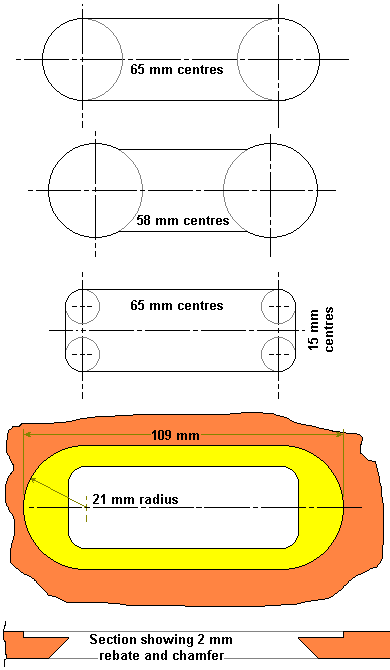Porter Hole Plates
Porter Escape
|
|
|
|---|
Porter Bee Escape Holes
The porter bee escape is widely used, but it's fitting and adjustment often leaves much to be desired.
|
Porter Hole Plates Porter Escape |
Porter Bee Escape HolesThe porter bee escape is widely used, but it's fitting and adjustment often leaves much to be desired. |
|---|
It is hoped that the sketches below will help those with limited workshop experience to make a better job than would otherwise have been the case.
|
The preferred method for 6 mm thickness plywood. Requires two 28 mm diameter holes to be drilled using a hole saw or a Forstner bit. The hole centres being 65 mm apart. Two lines are drawn 28 mm apart and the cuts are made with a jigsaw or pad saw then the edges are filed or rasped for a "press fit". 28 mm bits or hole saws are not very common so the alternative method uses a 32 mm diameter hole saw with the holes set on centres between 48 mm and 58 mm. Two lines are again drawn 28 mm apart and the cuts are made with a jigsaw or pad saw then the edges are filed or rasped for a "press fit". If no hole saws or other bits are available then a 13 mm (1/2") twist drill bit can be pressed into service. Four holes are drilled as left and the lines are drawn 28 mm apart and across the ends. The cuts are made with a jigsaw or pad saw then the edges are filed or rasped for a "press fit".
If 9 mm plywood is used then the "Rolls
Royce" method can be applied. With the porter escape let into the
upper surface of the ply and the underside of the aperture chamfered
at the ends. whichever method is used to cut the holes, even after filing, they will benefit from the application of sandpaper to smooth the cut edges. After smoothing a little Petroleum Jelly rubbed into the cut surface will reduce propolising to an absolute minimum. |

|
|---|
Original Psion 5 Version... July 1999, Revised... Autumn 2001, Revised... 11 October 2002 Upgraded... 20 September 2005, Further Upgraded... 11 March 2007,
|